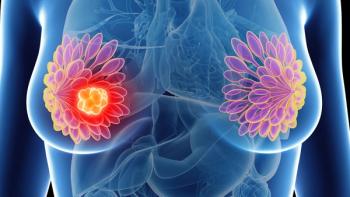
Nurse Intervention Helps Patients Maintain Physical Activity, Quality of Life During Cancer Treatment
The implementation of the Oncology Nursing Society’s new Get Up, Get Moving Program helped patients increase their daily step intake and maintain their health-related quality of life.
Oncology nurses may help patients improve quality of life (QOL) by implementing the Oncology Nursing Society (ONS)’s new Get Up, Get Moving Program into treatment plans, findings demonstrated from a pilot study published in the Clinical Journal of Oncology Nursing.1
In addition, the findings suggested that nurses who discuss physical activity with patients at their first visits, including physical activity in the treatment plan and planned weekly telephone calls from nurses, can help encourage and sustain patient activity.
The study found that patients who received nurse intervention had significantly increased exercise levels by the conclusion of the 12-week program. Although both groups started with similar mean scores in the Godin-Shephard Leisure-Time Physical Activity Questionnaire (34.75 and 31.11, respectively), the experimental group had a mean score of 48.67 (SD = 23.29; t = –3.555; degrees of freedom [df] = 8; P = .007) at the end of the program, compared with a mean of 29.25 (SD = 18.6; t = 0.754; df = 7; P = .47) among patients who did not receive intervention.
“This 12-week pilot study illustrates that the ONS Get Up, Get Moving Program, coupled with weekly nurse telephone calls, is 1 example of a low-cost, easy-to-implement, nurse-led intervention to possibly mitigate health-related QOL declines and increase activity level outcomes of patients with cancer,” wrote Judi K. Forner, DNP, APRN, ACNS-BC, RN-BC, OSF HealthCare Cardiovascular Institute, and colleagues. “Traditionally, oncology nurses recognize and treat therapy-related symptoms. However, they are also pivotal in supporting physical activity and other positive behaviors through therapeutic communication.”
The randomized pilot study assessed a total of 17 patients at a Midwestern hospital-based outpatient infusion center and took place between November 2019 and August 2020. To be eligible, patients needed a stage I to II solid tumor breast cancer or prostate cancer diagnosis or a stage I to III colon cancer diagnosis.The age of participants ranged from 30 to 80 years of age, and at the time of the study, all patients were being treated with either chemotherapy, radiation, or a combination of the 2.
All of the participants received a Fitbit Inspire activity tracker and select materials related to the study. The 8 members of the control group continued standard care while the 9 members in the intervention group received weekly telephone coaching phone calls from a clinical nurse specialist. The Get Up, get Moving Intervention Program lasted 12 weeks, although admission was staggered to align with patient consent.
Both groups reported their daily step count on weeks 1 and 12, however, the intervention group also reported their daily steps each week throughout the program. Initially, the step counts were similar between the 2 groups (intervention group, 6,337 steps vs control group, 6,169 steps). By the conclusion of the program, the intervention group was reporting significantly more daily steps than the control groups (8,047 steps vs 4,478 steps, respectively). The step counts combined with the Godin Scale Scores showed that intervention with the program resulted in increased physical activity.
Furthermore, the study indicated that physical activity intervention may also help sustain QOL throughout cancer treatment. The group who received nurse intervention did not report changes in their self-reported, health-related QOL. In comparison, the control group reported both a decline in general health as well as a trend toward lower energy and fatigue.
“The ONS Get Up, Get Moving quality improvement initiative provides evidence-based tools that oncology nurses can use to implement the program at their own cancer center. As the research has supported, low-impact exercise, even as simple as walking, can possibly decrease cancer treatment symptoms of fatigue and nausea while helping to maintain their quality of life,” Forner said in a press release. “We owe it to our patients to encourage physical activity during cancer treatment.”
Researchers noted that their investigation was hindered by the spread of the COVID-19 pandemic, since stay-at-home orders and mandates resulted in recruitment and physical activity transitioning to online and that exercise regimes were modified to comply with closed facilities and stay-at-home orders. Despite this, the study was able to continue in a modified fashion because the nurse intervention involved remote weekly telephone calls.
“This illustrates that a low-cost intervention using nurse-driven telephone calls and activity trackers could increase physical activity; the findings can add to best practice guidelines showing that regular physical activity can mitigate some of the psychological and physiologic effects of cancer treatment at relatively little cost,” the study authors wrote.
Study limitations included small sample size and short study time duration. The study authors concluded that future research should seek to understand the relationship between physical activity and health-related QOL among a larger sample of participants and different cancer types and treatments. Additionally, they added, redesigning the study is needed to assess intervention longer than 12 weeks, which may provide more specific insight into how the program affects long-term QOL.
Reference
Forner JK, Doughty A, Dalstrom MD, Messer BL, Lizer SK. A nurse-led physical activity coaching program to improve the quality of life of patients with cancer during the COVID-19 pandemic. October 2021. Accessed October 18, 2021. CJON. 2021;25(5) 571-577. 10.1188/21.CJON.571-577
Newsletter
Knowledge is power. Don’t miss the most recent breakthroughs in cancer care.































































































